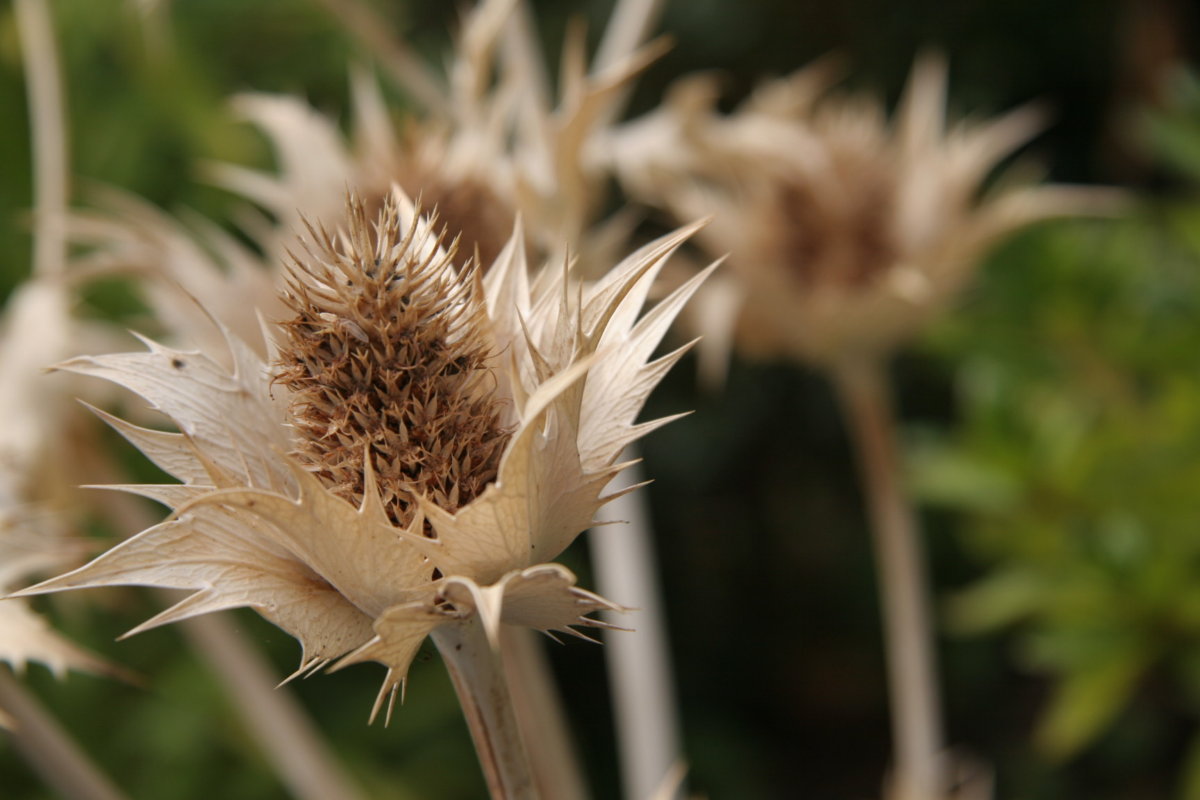
Don’t clean up all the plant debris in your landscape. Dead plants provide homes for beneficial insects, and seed pods and stems provide visual interest in the winter garden. Mark J Handel, Flickr.
Cleaning up your landscape in the fall will help keep it healthy and reduce maintenance tasks next year. But some fall cleanup can be unnecessary or even counterproductive. Here are some tips and what to do—and what not to do.
Fall garden cleanup: do this
Do rake leaves off your lawn.
Leaves, especially wet leaves, can thin your lawn in a very short time. Fallen leaves smother the grass. This prevents water from evaporating and eliminates air exchange. The combination of wet plants and low oxygen can cause fungus, mold and disease. It essentially rots your lawn. Rake or blow leaves off your lawn at least once a week during peak leaf fall.
But don’t throw away those leaves. Rake them into your garden beds; they are excellent mulch. You could also add leaves to your compost pile. Composted leaves make great soil amendments.
Do dispose of diseased leaves.
Rake and remove leaves from under your rose bushes and other trees or shrubs that are prone to disease, such as fruit trees, ornamental cherries and plums, and dogwoods. Removing leaves will help reduce fungal diseases, like black spot and powdery mildew, next year. Do not compost these leaves. Put them in yard waste bins for pickup.
Do clean up weeds.
Pull weeds that have sprouted in your garden beds. In western Washington, we have a number of weed species that sprout and grow during the winter. It is best to pull weeds when they are small, before they can grow and set seed. If you have weeds that have already matured and set seed, remove and dispose of them carefully. Weeds left in the garden will go to seed, producing hundreds of new weeds next year.
Do clean up your fruit trees and vegetable garden.
Remove fallen fruit and any fruit remaining on the tree. This will keep insects from overwintering and causing problems next spring. Dispose of fruit.
Pull vegetable plants that are no longer bearing. Make sure to remove tomato plants to reduce late blight problems. Healthy material can go in a compost bin if you have one. If you suspect disease, dispose of the material in the yard waste bin at the curb.
Do pick up debris such as boards or bricks.
They provide great shelter for slugs, snails and other garden pests.
Fall garden cleanup: don’t do this
Don’t remove all the plant debris.
Plant debris, such as dead plant stems, dried seed pods and faded ornamental grasses, provides homes for pollinators and other beneficial insects such as native bees, spiders, ladybugs and beetles. These insects may also rely on logs, brush piles or dead ground cover to winter in. However, you should remove seed heads on perennials that readily self-sow.
Birds will welcome some plant debris. The seeds and insects left in the garden will provide food for them during the coldest part of the year. And they will help control pest insects during next year’s garden season. Local, native plants are especially important to keep, as they are most likely to provide food for local wildlife.
And leave some dead plants for winter interest. The winter garden provides more visual interest if it hasn’t been cut to the ground. Dead stems lend height, and some seed pods have a sculptural quality.
Don’t remove all the leaves in garden beds.
Leave fallen leaves under native trees. They are essential habitat for overwintering beneficial insects. Leaf litter is prime habitat for many pollinators and critters that help control pests.

Trackbacks/Pingbacks